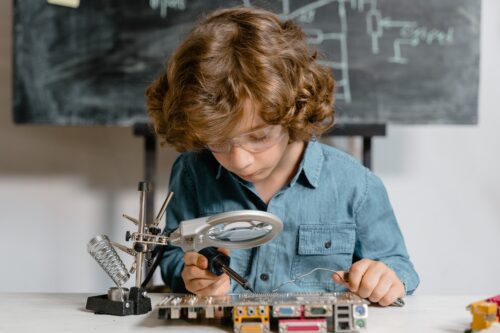Education Level
Middle School
Dreaming of blasting off to the stars, cleaning the oceans, curing cancer or starting the next electric car company? If you’re thinking about a career in STEM, now is the time to start! The basic math and science skills you learn in middle school will be your launching point to more advanced classes in high school. This is the time when you’ll discover how the STEM skills you’re learning translate into real careers—including in life sciences and biotechnology.
View Career Roadmap
Future Start Your Journey
Preparing For Jobs of the Future
Remember, biotech isn’t just about biology, it also employs people who have robotics, artificial intelligence, and computer science skills. Each part of STEM involves some aspect of the others. Get this: studies show that the majority of middle school students will work in jobs that don’t even exist yet. That means you might be able to use your science, technology, engineering, and math skills to create your own job in biotechnology!
Remember, biotech isn’t just about biology, it also employs people who have robotics, artificial intelligence, and computer science skills. Each part of STEM involves some aspect of the others. Get this: studies show that the majority of middle school students will work in jobs that don’t even exist yet. That means you might be able to use your science, technology, engineering, and math skills to create your own job in biotechnology!
Explore Exploring STEM
Exploring STEM subjects and enhancing your skills outside of school is a great way to learn about career paths. Online courses and workshops in math concepts, genetics, app development, coding, and programming are available on a per-class or subscription basis. Here are a few to start with.
STEM What is STEM?
Science
To advance a career in STEM, one must demonstrate proficiency in an area of scientific study. Whether it be biology, climatology, or vulcanology – no matter your interest – there is an area of science to captivate your mind and stimulate your creativity.
Technology
It could be gadgets, innovative processes, or computer science… technology is everywhere. Along with engineering, technology is the way we innovate and change the physical world. Just look around, your cell phone is a combination of years of new technologies: a calculator, music player, computer, phone, and camera. Now that’s all in a single device… what will you come up with next?

Find My Dream Job!

Engineering
This is how we develop and test new technologies, materials, and processes. Engineers will have a strong background in physics and a special area of expertise, like aerospace, electrical, or even biological engineering. Engineers also use science and math to build and test new technologies.
Math
Mathematics is the underlying set of principles that enable each of the other branches of STEM and allow for improvement through the scientific process. Statistics, data modelling and applied mathematics are all ways to take scientific observations and make sense of them.



